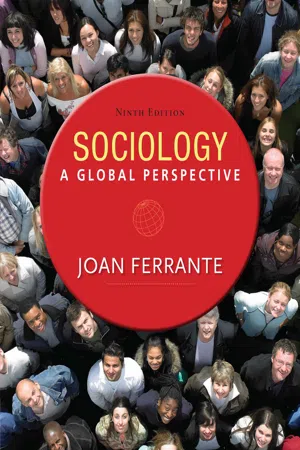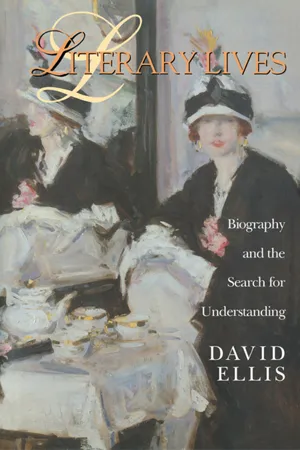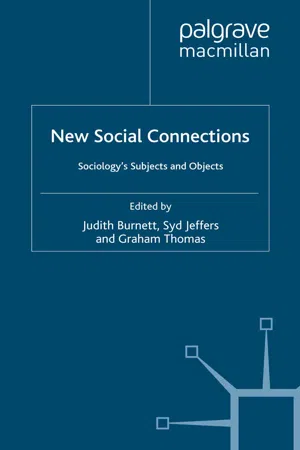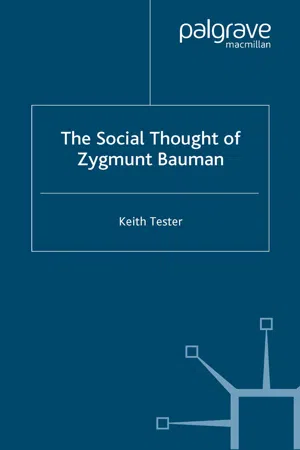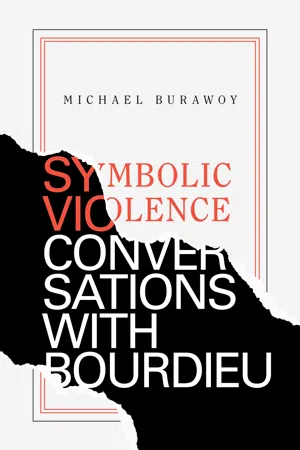Social Sciences
Sociological Imagination
The sociological imagination is a concept introduced by sociologist C. Wright Mills, which encourages individuals to understand their personal experiences within the broader social and historical context. It involves the ability to see the connections between personal troubles and public issues, allowing individuals to recognize the influence of societal forces on their lives. This perspective helps people to critically analyze and understand the world around them.
Written by Perlego with AI-assistance
Related key terms
1 of 5
11 Key excerpts on "Sociological Imagination"
- eBook - PDF
Sociology
A Global Perspective
- Joan Ferrante, , , (Authors)
- 2014(Publication Date)
- Cengage Learning EMEA(Publisher)
The payoff for those who possess a Sociological Imagination is that they can better understand their own experiences and fate by locating themselves in a larger historical, cultural, and social con- text, that they become aware of the many individuals who share their situations, and that they can plan a constructive response to larger social forces impacting their lives. The Sociological Imagination 5 From a profit-making point of view, the 1.6 million drivers who haul large loads and the 1.3 million who drive delivery trucks just in the United States alone (U.S. Bureau of Labor Statistics 2013) represent “costs” of delivering a product from one destination to another. As driverless technology is perfected, we can anticipate that the jobs of truck drivers will eventually disappear. Obviously, this job loss is not the result of personal failure or shortcomings. From a socio- logical point of view, the profit-making model that drives capitalist economies to reduce labor costs must be addressed. Chris Caldeira troubles Personal needs, problems, or difficulties brought on by individual shortcomings related to motivation, attitude, ability, character, or judgment. issue A matter that can be explained only by factors outside an individual’s control and immediate environment. Chris Caldeira Copyright 2013 Cengage Learning. All Rights Reserved. May not be copied, scanned, or duplicated, in whole or in part. Due to electronic rights, some third party content may be suppressed from the eBook and/or eChapter(s). Editorial review has deemed that any suppressed content does not materially affect the overall learning experience. Cengage Learning reserves the right to remove additional content at any time if subsequent rights restrictions require it. Those who possess the Sociological Imagination are able to see a connection between larger social forces and the day-to-day activities in which they engage. - eBook - ePub
Human Rights Policing
Reimagining Law Enforcement in the 21st Century
- Peter Marina, Pedro Marina(Authors)
- 2022(Publication Date)
- Routledge(Publisher)
The kind of sociology I learned at the New School … has very little to do with what goes on with sociology today, except for the background—when people talk about the classics … (Sociology) suffers from two diseases. One is … “methodological fetishism.” Whatever cannot be put in terms of statistical data is not real. That is crazy … they do not help you to understand society as a whole. The other disease is ideological … the sociology of identity … politically left or center and culturally anti-bourgeois … That is unfortunate. Even if my politics were left or center … I would deplore that … most of what people write about is very trivial, such as relationships between X-ray technicians and nurses in a hospital … What these earlier guys tried to understand was: what is our society going through, what is the direction of social change, what is modernity. And about that, you do not get much questioning today.(Vera 2016, 27)1But we have yet to give new verbiage to the concept so we remain stuck with the “Sociological Imagination.”To its credit, when sociology mattered, and asked the big questions about the nature of reality, the foundations of knowledge, and the causes of historical change, many sociologists employed that magic of the Sociological Imagination. Eventually, that imagination spread to the other philosophical disciplines including anthropology, psychology, economics, political science, criminology, and history––at least, to the best scholars within those respective disciplines.Most importantly, the Sociological Imagination is a powerful way of thinking about the world, and it’s a concept that belongs to the public, not some privileged academics living in the safety of the university. It’s a concept that belongs to all people, possesses the ability to empower all people, and provides a powerful way to understand the world beyond our subjective experiences. What’s more, we ask you to consider using the Sociological Imagination in all your police work to advance the goals of human rights policing.You learned from the previous chapters all about the meaning of human rights, human rights policing social interactions, and the power of human agency as it relates to achieving human rights policing, among other things. Now we invite you to the fruits of thinking in powerful new ways about the world. We invite you to an imagination that will help you better understand the world and the communities you serve. We invite you to a way of thinking that will improve the institution of law enforcement and advance the goals of a human rights policing as we push into the 21st century. - eBook - PDF
Taking It Big
Developing Sociological Consciousness in Postmodern Times
- Steven P. Dandaneau(Author)
- 2001(Publication Date)
- SAGE Publications, Inc(Publisher)
What Is the Sociological Imagination? The Sociological Imagination is the name that Mills assigned to his distillation of the form of mind lying back of what he also called the classic tradition in modern so-cial theory. The phrase Sociological Imagination is somewhat arbitrary. As Mills notes, the term matters less than the idea. 8 Likewise, the phrase classic tradition refers only to a definable and usable set of traditions whose essential feature is the concern with historical social structures. 9 As I have noted, this tradition in-cludes the works of Max Weber, Karl Marx, Emile Durkheim, George Herbert Mead, and a host of similarly luminous nineteenth- and early twentieth-century so-cial thinkers, many of whom did not regard themselves as sociologists. But, as Mills argued, all of these classic social thinkers shared a common set of basic questions: What is the structure of this particular society as a whole? Where does this society stand in human history? What varieties of men and women now prevail in this soci- Toward a Postmodern Sociological Imagination 71 ety and in this period? 1 Although none of these classic thinkers would have used precisely these words to describe their own way of thinking, these questions derived from the possession of a Sociological Imagination. Let me provide a definition of the Sociological Imagination using Mills's own sophisticated language, which we shall momentarily unpack. Mills described the Sociological Imagination as a form of... self-consciousness or as a quality of mind that is firmly rooted in an absorbed realization of social relativity and of the transformative power of history. Once realized, the Sociological Imagination is ex-perienced as a transvaluation of values, which is to say, as a type of secular epiph-any, a terrible lesson but also, wrote Mills, in many ways a magnificent one. - eBook - PDF
Practising Social Work Sociologically
A Theoretical approach for New Times
- Priscilla Dunk-West, Fiona Verity(Authors)
- 2018(Publication Date)
- Bloomsbury Academic(Publisher)
PRACTISING SOCIAL WORK SOCIOLOGICALLY 34 C. Wright Mills’ Sociological Imagination Whilst we have talked in the first part of this chapter about a certain kind of imagination in social work, we now turn to pick up our second use of imagination, which is a way to see what can be taken for granted. You may be familiar with the phrase a ‘Sociological Imagination’, coined by the North American sociologist C. Wright Mills writing in the 1950s, and well used in social work literature (Lee, 1994 ; van Wormer, 2002 ). Mills defines a Sociological Imagination as the awareness of the ‘inter-play of … intimate settings with their larger structural framework’ (1970, p. 179), and attentiveness to how people’s private experiences, or ‘pains’, are connected to the ‘public troubles’ of the times. This is a capacity or sensibility to locate oneself in ‘… reference to the historical structures in which the milieux of … everyday life are organized’ (1970, p. 175). He elaborates: The Sociological Imagination, I remind you, in considerable part consists of the capacity to shift from one perspective to another, and in the process to build up an adequate view of a total society and its components. It is this imagination, of course, that sets off the social scientist from the mere technician. (1970, p. 232) Each of the social work pioneers in Chapter 2 penned autobiographies, situating themselves in their contexts and times. Alice Salomon neatly captures this spirit of a Sociological Imagination in her own autobiogra-phy, when she situates her ‘story’ in her historically shaped time: The life of a nation is made up of the lives of individuals, and the fate of the individual, passing his early years in the shelter of the family, gradually spreads out into its nation. - eBook - PDF
- Ian McIntosh, Samantha Punch(Authors)
- 2005(Publication Date)
- Edinburgh University Press(Publisher)
3 Sociological ImaginationS Getting students to think sociologically is clearly the key objective of any degree in sociology. In this chapter we outline what we think are some of the key characteristics of a recognisably sociological `way of seeing' (Berger and Kellner 1981) and a `Sociological Imagination'. This oft-used phrase was given to us by the celebrated North American sociologist Charles Wright Mills (1916±62) and was the title of his most famous book (1959). In that text he describes the Sociological Imagination as enabling us to `grasp history and biography and the relations between the two within society' (Wright Mills 1959: 6). The relation between history and biography, the individual and society, is often seen to be the hallmark of thinking sociologically. Wright Mills goes on to say that: No social study that does not come back to the problems of biography, of history and of their intersections within a society has completed its intellectual journey. (Wright Mills 1959: 6) Wright Mills was a great admirer of the classical sociologists and considered that the Sociological Imagination, as concerned with the above, was the `mark of the classic social analyst' (1959: 6). Thus, before saying more about a sociological perspective(s), we shall take a brief look at some key figures from sociology's `classical period' who continue to leave their imprint on the discipline. 17 THE EMERGENCE OF SOCIOLOGY It was once a prevalent belief that sociology was a trendy subject (somewhat hard to believe now!) and that it was very much a child of the 1960s. Although this was undoubtedly a time of great expansion for sociology in many countries in terms of student numbers, university departments and socio-logical literature, sociology as a recognised academic disci-pline has actually been around since the end of the nineteenth century. - eBook - PDF
Environments, Natures and Social Theory
Towards a Critical Hybridity
- Damian White, Alan Rudy, Brian Gareau(Authors)
- 2017(Publication Date)
- Red Globe Press(Publisher)
1 Introduction: The Socio-Ecological Imagination Nature does not exist for us, had no idea we were coming, and doesn’t give a damn about us. Stephen Jay Gould (1990:24) Why do we need social theory to understand environmental problems? What possible contribution can the critical social sciences make to debates that are generally seen as the primary domain of the natural and physical sciences? A half century ago the sociologist C. Wright Mills defended the centrality of a critical social theory to the academy and to the vitality of the public sphere by evoking the idea of the Sociological Imagination (Mills, 1959). Mills sug-gested that the Sociological Imagination was of central importance because it possessed the potential to connect “biography” to “history,” “private trou-bles” to “public issues.” What Mills had in mind here was an imaginary that could move beyond a narrow individualism to reveal how our common (human) fates are intertwined and connected to broader social forces, social institutions, forms of social stratification and social relations. But how can such an imminently social worldview guide us in an era of climate disrup-tion and widespread socio-environmental change? How can such a singular focus on social and political institutions help us when we are slowly coming to recognize that our common human fates are additionally connected to the fates of many other nonhumans, ecologies and broader material forces on the planet? Do we now need to deploy something a little more expansive to deal with the problems we face: the socio-ecological imagination? What might this be? At the most abstract material level , we might try and think of the socio-ecological imagination by observing that human social life is certainly enacted and reproduced through social institutions, cultural practices, technologies and political and economic institutions. - eBook - ePub
Literary Lives
Biography and the Search for Understanding
- David Ellis(Author)
- 2013(Publication Date)
- Routledge(Publisher)
6 The Sociological ImaginationIt is by means of the Sociological Imagination that men now hope to grasp what is going on in the world, and to understand what is happening in themselves as minute points of the intersections of biography and history within society.(C. Wright Mills, The Sociological Imagination(New York, 1959), p. 7)A recent life of the English cricketer Wally Hammond was subtitled 'The Reasons Why'. What needed to be explained was why almost all the people who met Hammond in his later years found him so singularly disagreeable. According to his biographer, the explanation lay in the mercury injections he was obliged to take for his syphilis. But, complained the reviewer of the book in the Times Literary Supplement , do we really need 'a chemical explanation for an unpleasant temperament?'; and even if we do, would not Hammond's 'daily heavy drinking' serve equally well? This was to oppose one organicist explanation with another, but the reviewer was in fact the partisan of a quite different approach. It was, he pointed out, only for a brief period that Hammond was recognised as 'the greatest cricketer in the world' so that 'the brooding discontent of the decline is adequately (if less sensationally) explicable as a reaction to the loss of that stature'.1It would be hard to over-estimate the effect on people's behaviour of how they are regarded within the various social groups to which they belong and, for many sociologists, over-estimation would in any case be impossible given the exclusive importance they attach to social affiliation. In the wake of Durkheim's pioneer work on suicide, his followers were bound to go further in attempts to 'collectivise' what we are accustomed to think of as essentially private phenomena. Even our memories of the past, Maurice Halbwachs ingeniously argued, are not exclusively our own: 'one remembers something only by adopting the perspective of one or more social groups, and by placing oneself again in one or more currents of collective thought'; and on the same page he conveniently defined what was, and to some extent still is the classic sociological approach: - eBook - PDF
New Social Connections
Sociology's Subjects and Objects
- J. Burnett, S. Jeffers, G. Thomas, J. Burnett, S. Jeffers, G. Thomas(Authors)
- 2010(Publication Date)
- Palgrave Macmillan(Publisher)
It is not possible to make sharp and absolute distinctions between these disciplines and the concerns of their practitioners. Sociology has grown and expanded through a dia- logue with other disciplines that have made possible the building of an awareness of the interdependence between the intersubjective, the material, and the temporal. Sociologists have, for example, long been concerned with nature, environment, and spatial organisation, and they have engaged in debates with geographers, ecologists, and others about these processes. These debates have also allowed ideas about the intersubjectively organised construction of material conditions to enter more fully into geographical debates. This kind of debate and dialogue has also marked the relationship between Sociology and more specialised social science disciplines. The work of sociologists in general theory and in particular specialisms has informed the arguments taking place in other disciplines, and the work of those in other disciplines has, in turn, influenced that of sociolo- gists. It is for this reason that a concern for the social is not found only in Departments of Sociology. The Sociological Imagination is a way of thinking about social phenomena that can be found in many other disciplines: in Political Science, Law, Business Studies, Religious Studies, Cultural Studies, the study of Education, and in numerous other special areas of investigation. Each discipline may define itself in relation to certain specific concerns and may employ other forms of intellectual imagination, but they have, since the growth of sociology, tended to have a sociological dimension to their work. Some of these specialised disciplines are organised around the investigation of autonomous social objects that can often be analysed without the need for any direct and continuing reference to the contextual social relations that give rise to them. - eBook - PDF
- K. Tester(Author)
- 2004(Publication Date)
- Palgrave Macmillan(Publisher)
34 2 The Emergence of an Imagination A Sociological Imagination never appears on the stage of history ready-formed and from nowhere. It is the product and expression of a frequently complex – although sometimes perhaps rather obvious – relationship between a number of factors. In particular, the Sociological Imagination in question emerges out of the circumstances of the relationships, and of the time and place within which the practitioner of the imagination started to think sociologically. A Sociological Imagination is itself a sociological phenomenon. It is not ahistorical, and neither is it natural or inevitable. There is no extra-social reason why a Sociological Imagination is practised or, more immediately, why it is practised in any given way. A Sociological Imagination has to be inspired. This chapter will outline and discuss the inspirations that lay behind the emergence of Zygmunt Bauman’s sociology, and therefore the factors that helped influence the character of his socio- logical imagination. However, this discussion is not carried out for only historical reasons. The point is that the work for which Bauman is best known takes on deeper resonance and richness if it is traced back to its very earliest roots. Two teachers The most obvious mode of inspiration is personal example. There can be no doubt that the work of Zygmunt Bauman was inspired in this immediate way. When given the opportunity he always acknow- ledges the debt that he owes to his two main teachers, Julian Hochfeld and Stanislaw Ossowski. They put in some of the foundations upon - eBook - PDF
Symbolic Violence
Conversations with Bourdieu
- Michael Burawoy(Author)
- 2019(Publication Date)
- Duke University Press Books(Publisher)
THE Sociological Imagination Mills Meets Bourdieu It is the political task of the social scientist—as of any liberal educator—continually to translate personal trou-bles into public issues, and public issues into the terms of their human meaning for a variety of individuals. It is his task to display in his work—and, as an educator, in his life as well—this kind of Sociological Imagination. — MILLS, THE Sociological Imagination Political competence, inasmuch as there can be a universal definition of it, undoubtedly consists in the ability to speak in universal terms about particular problems—how to sur-vive dismissal or redundancy, an injustice or an accident at work, not as individual accident, a personal mishap, but as something collective, common to a class. This universal-ization is possible only by way of language, by access to a general discourse on the social world. This is why politics is in part bound up with language. And here again, if you like, we can introduce a bit of utopia to attenuate the sad-ness of sociological discourse, and convince ourselves that it is not too naive to believe that it can be useful to fight over words, over their honesty and proper sense, to be out-spoken and to speak out. — BOURDIEU, “GIVING VOICE TO THE VOICELESS” Chapter Seven 134 All this means that the ethno-sociologist is a kind of organic intellectual of humanity, and as a collective agent, can contribute to de-naturalizing and de-fatalizing human existence by placing his skill at the service of a universalism rooted in the comprehension of different particularisms. - eBook - PDF
- J. Brewer(Author)
- 2003(Publication Date)
- Palgrave Macmillan(Publisher)
Economy and Society epitomises what Mills understood to be sociology’s way of thinking; even more rewarding perhaps was that The Sociological Imagination got twice the votes of Parsons’s two treatises, one on social action, the other on the social system, that epitomised what Mills took to be the subject’s narrow imagination and vision. Appropriately, Mills’s thumbnail picture features in the slightly irreverent Dead Sociologists Society gallery alongside the nineteenth- century figures that gave us the discipline and whose view of the Sociological Imagination reflected his own: a broad encompassing C. Wright Mills and the Sociological Imagination 27 discipline that was concerned with real-world events and whose discourse on public affairs ranged over history, politics, economics, ethics, philosophy and human nature (http://www2.pfeiffer.edu/ iridener/DSS/DEADSOC.html). Narrow sociology This view of the Sociological Imagination was worked out in opposition to three trends which dominated sociology at the time of Mills’s writing: general theory, abstract empiricism and social admin- istration. (In a draft of the book’s contents shown to Coser, the last of the three was called social pathology, reminiscent of Durkheim not Weber.) A similar account of sociology’s distorted traditions is found in E.H. Carr’s famous ‘What is History?’ (1961), in which he describes possible relationships between the two disciplines (also see Runciman, 1999: 140ff ). The contrast between theory and empiri- cism is something of a timeless dichotomy which Mills used to great effect (see Jenks, 1998, for a description of several antinomies that dominated sociology). Abstract empiricism reduced the discipline to technical problems of enumeration and analysis of quantitative data. The method of doing all this was by means of the survey and ques- tionnaire, and its ardent exponent at the time was Paul Lazarsfeld.
Index pages curate the most relevant extracts from our library of academic textbooks. They’ve been created using an in-house natural language model (NLM), each adding context and meaning to key research topics.
